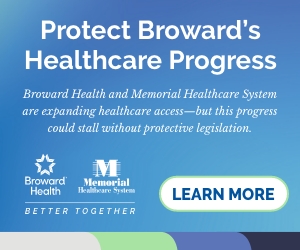President Donald Trump visited Florida last week, making a stop at The Villages, one of the highest concentrations of American citizens who depend heavily on prescription medications. During the stop, he highlighted one of his highest priorities: making prescription drugs affordable for all Americans.
One of the fastest ways to make that happen requires bold action in Tallahassee, and it’s needed sooner rather than later, because independent pharmacies are closing all across the state of Florida, giving rise to large chains that dominate the market, restrict consumer choice, and remove competition from the price equation. Worse, current public policy is slowly, but inevitably encouraging a shift toward an eventual oligarchy controlled by a small number of major drug chains like CVS and Walgreens.
That’s not going to help lower the cost of prescription medications.
Nearly one-third of all Americans already get their drugs through one of three middlemen, known as “pharmacy benefit managers,” or “PBMs.” And these three major PBM’s are all linked to major insurance companies, like UnitedHealth, Aetna (which also owns CVS drug stores), and the largest of all, Cigna, which owns ExpressScripts.
In short, under the guise of “saving patients money,” these behemoth organizations are actually restricting patients to the insurance company’s own in-house or in-network drug chain , which in turn, buys the drugs through an in-house pharmacy benefit manager or “PBM.” Neighborhood pharmacies can’t compete.
While a third of Americans are siloed into three major PBM’s, another third of all Americans also get their drugs through smaller, but still incredibly powerful PBM’s. All of these PBMs have become so large and carry so much clout that they are able to strong-arm small businesses and direct patients to the most lucrative pharmacies where they already have pre-existing agreements.
PBM’s were initially supposed to save patients money. What’s actually happening now is that drug “savings,” often in the form rebates, never trickle down to patients, and instead, get pocketed by the PBM’s and their parent companies. Those profits are then used to buy out local pharmacies, giving them even more leverage, while restricting choice for patients.
“PBMs are short circuiting the free market,” said Dawn Butterfield, owner of an independent pharmacy in Cocoa. “Across the state, these anti-competitive practices are used to slowly strangle neighborhood pharmacies and, when they are at the brink of closing down, the big box chains come in and try to buy them out. It’s out of control and dangerous for patients because it restricts access for countless Floridians.”
PBM’s are growing rapidly, and mergers are happening left and right as major players battle for dominance. The growth has been so explosive that PBM revenue already exceeds the revenues generated by the drug manufacturers themselves.
Millions of Floridians know this story all too well. Staywell Health Plan and Sunshine Health are the two largest managed care providers hired by the state to manage Florida’s Medicaid patients. But while they are supposed to negotiate better prices, in reality, they are forcing pharmacies to take losses on prescriptions each time a patient walks through their doors. For one commonly prescribed pediatric antibiotic, the cost to the pharmacy was approximately $50, but reimbursed less than half that amount. That means these pharmacies lose almost $30 each time they dispense the drug. That’s not a sustainable business model – unless you’re a big box chain that also owns the PBM and can offset those deep discounts with other PBM charges.
Patients may have had a relationship with a local pharmacist, but under some managed care providers, they are forced to buy drugs from large chains like CVS. In many cases, this means patients are forced to drive longer distances, and for some, that means they don’t bother to get their drugs when they need them.
Poor Floridians, rural residents and senior citizens are impacted most, and the numbers aren’t pretty. A recent study, published in April, found that patients who recently lost access to their local pharmacy don’t stick to their doctor’s recommended treatment plan:
Drops in adherence were greatest among patients using independent pharmacies, filling prescriptions at a single store, or living in low-access areas with fewer pharmacies. Closures disproportionately affected pharmacies and patients located in predominantly black, urban, and low-income neighborhoods.
Republican lawmakers addressed part of the problem during the 2018 Legislative Session when they passed, and Governor Scott signed, HB 351, which eliminated the so-called “gag orders” in contracts negotiated by PBMS, a provision which prevented pharmacists from informing customers about lower prescription drug prices that could save patients money.
But much more can be done, especially by a legislature and governor who espouse free market principles. The current PBM process is highly secretive. Contracts between PBM’s and pharmacies aren’t disclosed nor transparent, and these “take it or leave it” contracts typically contain disproportionate clauses that allow PBM’s to squeeze in-network pharmacies for money. Once the local pharmacy starts losing cash, they can expect to get an offer letter from one of the major PBM chains offering to buy them out, resulting in an eventual closure that further restricts patient choice, but maximizes profit for the PBM chain.
“We need state lawmakers to act now and demand accountability from PBMs and the state’s own managed care providers,” Butterfield said. “Neighborhood pharmacies aren’t looking for much. We just want a fair chance to compete in the marketplace and show patients the benefits of getting your medications from someone who treats you like a person and not a profit source.”
There are about 1,300 local pharmacies in Florida with over 12,000 full-time employees. In 2017 alone, they filled over 78 million prescriptions and generated over $4 billion in additional economic activity. But they are facing enormous pressure when they are excluded from dispensing drugs to patients in certain networks.
Several advocacy groups are seeking legislation that will combat the trend of low reimbursements, reduce anti-competitive practices, including exclusion from networks, and require greater transparency and accountability from PBMs.




